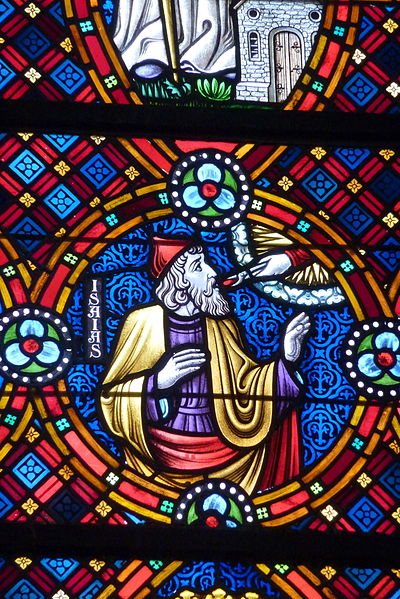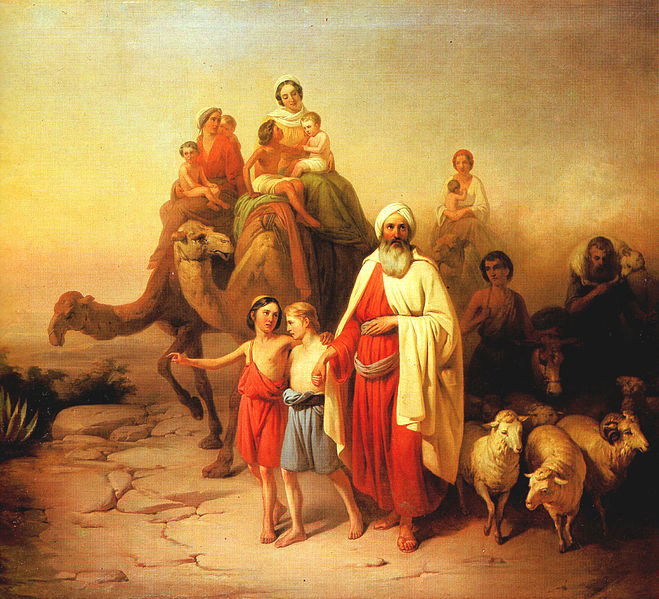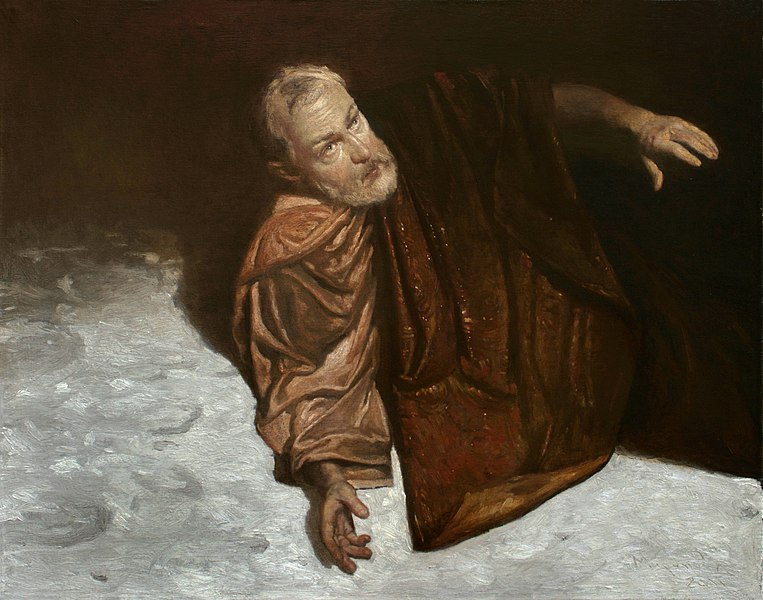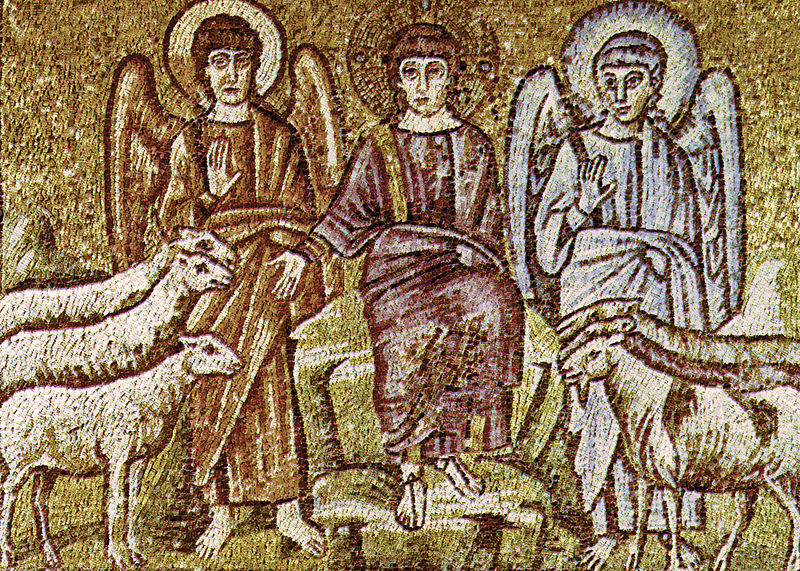(前編を読む)
反対側
[toggle]The Other Side[/toggle]この見方(教会の目的は、世界をより良い場所にすることではなく、より良い場所、教会と呼ばれる場所に世界を招待すること)が福音派クリスチャンの間で広く受け入れられていないこと、そしてその正当な理由も私は知っている。教会は目的ではなく手段であり、それは世界のために作られたという、正反対な考えを示唆するような聖句が多くあるのだ。そこで、これらの節のいくつかを見なければならない。
[toggle]I recognize this point of view is not widely held among evangelical Christians, and for good reason. There are many verses in Scripture which seem to suggest just the opposite—that the church is not an end but a means, that it was created for the sake of the world. So we need to look at some of these passages. [/toggle]
ベルギーの聖マルティン教会にある預言者イザヤのステンドグラス(写真:GFreihalter)
その典型的な聖句がイザヤ42章だ。
[toggle]The classic expression comes from Isaiah 42: [/toggle]主であるわたしは、恵みをもってあなたを呼び
[toggle]I am the Lord, I have called you in righteousness,
あなたの手を取った。
民の契約、諸国の光として
あなたを形づくり、あなたを立てた。
見ることのできない目を開き
捕らわれ人をその枷から
闇に住む人をその牢獄から救い出すために。(イザヤ42:6~7)
I have taken you by the hand and kept you;
I have given you as a covenant to the people,
a light to the nations,
to open the eyes that are blind,
to bring out the prisoners from the dungeon,
from the prison those who sit in darkness (Is. 42:6-7). [/toggle]
そして、世界中の人々がエルサレムにやって来るというイザヤのビジョンについての先ほどの引用にも公平に触れよう。それは次のように終わっている。
[toggle]And let me be fair with my quote of Isaiah’s vision in which people from all over the globe come to Jerusalem. It ends like this: “For out of Zion shall go forth instruction, / and the word of the Lord from Jerusalem.” [/toggle]主の教えはシオンから、御言葉はエルサレムから出る。(イザヤ2:3)

モルナール・ヨージェフ「アブラハムの出発」
それから、アブラハムへの神の言明もある。
[toggle]And then there is this key statement of God to Abraham: “… in you all the families of the earth shall be blessed.” [/toggle]地上の氏族はすべて、あなたによって祝福に入る。(創世記12:3)
このような聖句はとりわけ、イスラエルが世の光であるという主たる使命に失敗したこと、そしてイエスがこの世での働きの最後、絶対的に明らかに教会がその目的を持っていると明確にしたことを示唆するためによく使われる。
[toggle]Such verses are often used to suggest, among other things, that Israel failed in its primary mission–being a light to the world–and that Jesus, at the end of his ministry, made sure that the church was absolutely clear about its purpose: [/toggle][toggle]Now the eleven disciples went to Galilee, to the mountain to which Jesus had directed them. When they saw him, they worshiped him; but some doubted. And Jesus came and said to them, “All authority in heaven and on earth has been given to me. Go therefore and make disciples of all nations, baptizing them in the name of the Father and of the Son and of the Holy Spirit, and teaching them to obey everything that I have commanded you.” (Mt. 28:16-20). [/toggle]「わたしは天と地の一切の権能を授かっている。だから、あなたがたは行って、すべての民をわたしの弟子にしなさい。彼らに父と子と聖霊の名によって洗礼を授け、あなたがたに命じておいたことをすべて守るように教えなさい。わたしは世の終わりまで、いつもあなたがたと共にいる」(マタイ28:18~20)
明白なことは何だろうか。教会の目的は、すべての国に行き、使命をもって世界に出かけ、宣教することであると、この聖句は示唆している。
[toggle]What could be more clear? Such passages suggest that the purpose of the church is to go out to all nations, to go out into the world on mission, to be missional. [/toggle]しかし私の見解では、そうではない。
[toggle]Not quite, in my view. [/toggle]まず、創世記のその主要な聖句の文脈に注意しよう。神はアブラハムに対して、彼の子孫が偉大な民族になり、この国を祝福する人は祝福され、呪う人は呪われると伝えている。その意味は、アブラハムの子孫を祝福するので、地上の他のすべての氏族が祝福されるということだ。これはアブラハムの宣教的目的についてではなく、世界的視点におけるアブラハムの子孫の地位について書かれている。イスラエルの国は、神のために造られたという神の究極の目的のしるしであり、祝福されていることを知り、誇りに思う人々のしるしなのだ。
[toggle]First, note the context of that key verse in Genesis. God tells Abraham that his family will become a great nation, and that those who bless this great nation will be blessed, and those who curse this nation will be cursed. The implication is that all the other families of the earth will be blessed as they bless the family of Abraham. It’s not about Abraham’s missionary purpose, but about the family of Abraham’s status in the eyes world. The nation of Israel is a sign of God’s ultimate purpose—to create a people for himself—and those who recognize and honor that will be blessed. [/toggle]イザヤ書に戻る前に、弟子たちへのイエスの委任を見てみよう。イエスが誰に対して、あらゆる国の人々を弟子にするよう命じられているかに注意してほしい。それは11人の弟子に対してであり、それで全部だ。この聖句は、すべてのクリスチャンと教会に自動的に適用される。つまり、最初の弟子たちへの召しは、私たちへの召しと同等視されているのだ。しかし、新約聖書をより広く読み進めると、この命令は実際には11人の弟子にだけ与えられている。それは、イエスから直接学んだ弟子たちが使徒となり、他の人々にイエスについて話をするために「送り出された」ということであり、この11人が最初の使徒だ。
[toggle]We’ll return to the Isaiah passage, but for now let’s move ahead to Jesus’ commission to the disciples. Note exactly to whom Jesus commands to make disciples of all nations: The eleven disciples. That’s all. We automatically apply this verse to all Christians and to the church in general, equating as we do the calling of the original disciples with our calling. But in a larger reading of the New Testament, this command is actually only given to the eleven disciples. It’s the point at which the disciples—learners of Jesus—become apostles, those “sent out” to tell others about Jesus. These eleven very much become the first apostles. [/toggle]
アンドレイ・ミロノフ「ダマスコ途上の回心」
しかし、すべてのクリスチャンが使徒と呼ばれるわけではない。パウロがエフェソ書で聖霊の賜物を挙げている。「ある人を使徒、ある人を預言者、ある人を福音宣教者、ある人を牧者、教師とされた」(エフェソ4:11)。ある人は使徒だが、すべてではない。また、エフェソ書にはどこにも、世界に送り出されることが教会の主な目的だとは示唆されていない。
[toggle]But not every Christian is called to be an apostle. As Paul says in Ephesians when listing the gifts of the Holy Spirit, “The gifts he gave were that some would be apostles, some prophets, some evangelists, some pastors and teachers…” (4:11). Some are apostles. Not all. Nor does he suggest here or anywhere in Ephesians that being sent out to the world was the main purpose of the church. [/toggle]「この恵みは、聖なる者たちすべての中で最もつまらない者であるわたしに与えられました。わたしは、この恵みにより、キリストの計り知れない富について、異邦人に福音を告げ知らせており」(3:7~8)。しかしパウロは、自分の召しがすべてのクリスチャンや教会一般の召しであるとは言っていない。それはパウロへの呼びかけであり、他の使徒たちへの呼びかけなのだ。
[toggle]He specifically says that he is so called: “Although I am the very least of all the saints, this grace was given to me to bring to the Gentiles the news of the boundless riches of Christ,” (vv. 7-8). But he does not even hint that his calling is every Christian’s calling, or that of the church in general. It’s his call, and that of the other apostles. [/toggle]だから、教会には使徒と呼ばれる人々がいる。これらの人々は、世界に出て行って説教をし、教えるように求められている。そして、まさに神の民の教えが世界に出て行くという意味がある。そして、イザヤ書の一節(「飢えている人に心を配り、苦しめられている人の願いを満たすなら、あなたの光は、闇の中に輝き出で、あなたを包む闇は、真昼のようになる」58:10)にとても美しく表現されているように、私たちは世界にとっての光であり塩である。私たちの伝道への呼びかけを無視してはならない。
[toggle]So yes, there are people in the church called apostles who very much are called to go out into the world and preach and teach. And yes, there is a sense in which the teaching of God’s people goes out into the world. And yes, there is a sense in which we are light and even salt for the world, as that passage from Isaiah so beautifully expresses. Let us not denigrate our evangelistic call. [/toggle]しかし、私が言いたいのは、これらがすべての神の民に対する目的ではないということだ。それは明らかに何人かの神の民への呼びかけである。だから、私たち神の家族がすべきことは、祈りと献げ物を通して、彼らの使徒的・伝道的な働きを支援することだ。しかしそれは、教会の目的、教会が存在する理由とはかけ離れている。
[toggle]But let me suggest that all this does not constitute our very purpose as the people of God. It is clearly the calling of some of the people of God. And so it must be the calling of others in the family of God to support them in their apostolic and evangelistic work, through prayer and giving. But that is a far cry from this being the very purpose of the church, the reason for its existence. [/toggle]
イタリア・ラヴェンナにあるサンタポリナーレ・ヌオヴォ聖堂のモザイク
イエスが社会正義への呼びかけについて語っているマタイ25章はどうだろう。イエスは、終末における神の裁きは、私たちの社会正義の努力によって決定されると示唆しているようだ。これ以上に私たちの目的を示すことができるだろうか。
[toggle]What about Matthew 25, where Jesus speaks about the call to social justice? Jesus seems to suggest that the judgment of God at the end of history will be determined by our social justice efforts. What could indicate our purpose more than this? [/toggle]この箇所でイエスは、世界中の人々が彼の前で裁きに集まる場面を描写している。そして、二つのグループ、羊と山羊に分けて、羊に言う。
[toggle]In that passage, Jesus describes a scene where people from all over the world are gathered before him at the judgment. He separates them into two groups, the sheep and the goats, and he says to the sheep: [/toggle]そこで、王は右側にいる人たちに言う。「さあ、わたしの父に祝福された人たち、天地創造の時からお前たちのために用意されている国を受け継ぎなさい。お前たちは、わたしが飢えていたときに食べさせ、のどが渇いていたときに飲ませ、旅をしていたときに宿を貸し、裸のときに着せ、病気のときに見舞い、牢にいたときに訪ねてくれたからだ」
[toggle] “Come, you that are blessed by my Father, inherit the kingdom prepared for you from the foundation of the world” [notice the language here, the same as in Ephesians, before the foundation of the world God was preparing the kingdom for himself] “for I was hungry and you gave me food, I was thirsty and you gave me something to drink, I was a stranger and you welcomed me, I was naked and you gave me clothing, I was sick and you took care of me, I was in prison and you visited me.” [/toggle]すると、正しい人たちが王に答える。「主よ、いつわたしたちは、飢えておられるのを見て食べ物を差し上げ、のどが渇いておられるのを見て飲み物を差し上げたでしょうか。いつ、旅をしておられるのを見てお宿を貸し、裸でおられるのを見てお着せしたでしょうか。いつ、病気をなさったり、牢におられたりするのを見て、お訪ねしたでしょうか」
[toggle]Then the righteous will answer him, “Lord, when was it that we saw you hungry and gave you food, or thirsty and gave you something to drink? And when was it that we saw you a stranger and welcomed you, or naked and gave you clothing? And when was it that we saw you sick or in prison and visited you?” [/toggle]そこで、王は答える。「はっきり言っておく。わたしの兄弟であるこの最も小さい者の一人にしたのは、わたしにしてくれたことなのである」(マタイ25:34~40)
[toggle]And the king will answer them, “Truly I tell you, just as you did it to one of the least of these who are members of my family, you did it to me.” (Mt. 25:34-39, NRSV). [/toggle]
米国の新改訂標準訳(NRSV、The New Revised Standard Version)では、文字どおりの「兄弟」を「自分の家族の一員」(members of my family)として適切に表現している。世話を必要とするのは、一般の人だけでなく、苦しむ人だ。この質問にある特定の人々とは、神の民、キリストの兄弟姉妹、神の家族のメンバーだ。この場合、正義への呼びかけは、正義への呼びかけでさえなく、実際に誤りは正されていない。これは、窮地に陥っている神の人々への思いやりをシンプルに呼びかけているのだ。苦しんでいる家族に対して、教会が特に注意を払うことが求められている。特に信仰の家族に善を行うべきだというパウロの命令に耳を傾けよう。
[toggle]This version, the NRSV, has appropriately rendered the literal “brothers” as “members of my family.” The people who need ministering to are not just people in general, anyone who suffers. The specific people in question are the people of God, the brothers and sisters of Christ, members of the family of God. The call to justice, in this instance, is not even a call to justice–no wrongs are being righted in fact. It’s a simple call for compassion for the people of God when they are in dire straits. It’s a call for the church to be especially attentive to those in the family who suffer. It harkens to Paul’s injunction that we should do good to all men, but especially to those in the household of faith. [/toggle]イザヤ、エレミヤ、アモス、ミカなどの預言書の聖句はどうだろう。彼らは私たちに対して、社会正義について関心を持つよう命じていないだろうか。未亡人や孤児を抑圧して居住者を虐待する人々に対する手厳しい裁きはどうだろう。誰が正義をする代わりに賄賂(わいろ)を受け入れたか。これは、社会の中で正義のために働くという明確で明快な呼びかけではないだろうか。
[toggle]What about the prophetic passages from Isaiah, Jeremiah, Amos, and Micah, to name a few? Don’t they enjoin us to be concerned about social justice for all? What about all those harsh judgments against those who oppress widows and orphans and mistreat the sojourner? Who accept bribes instead of doing justice? Is this not a clear and clarion call to work for justice in society? [/toggle]そうだとも、そうではないとも言える。誰でも気づくように、クリスチャンが社会の中で正義のために働く必要性を否定することはほとんど不可能だ。不正に対して心を痛めず、世界の苦しみを軽減するために何もしないクリスチャンは、そもそもクリスチャンではない。しかし、話を戻そう。
[toggle]Yes and no. As we’ll note in a bit, one can hardly deny the need for Christians to work for justice in society. Any Christian whose heart does not break over injustice, who does nothing to alleviate suffering in the world, is likely not a Christian in the first place. But we’ll come back to this. [/toggle]預言者は、アッシリアやバビロン、その他の地での未亡人や孤児、賄賂(わいろ)についてほとんど心配していないことに、私たちはしばしば気づいていない。しかしイスラエルとユダでは、神の民の間でそれが起こっているので、とても心配しているのだ。
[toggle]In the case of the prophetic literature, however, we often fail to recognize that the prophets are little concerned about the widows and orphans and bribes in Assyria, Babylon, and elsewhere. But they are very concerned about it in Israel and Judah, very concerned about it as it is practiced among the people of God. [/toggle]神の民が諸国民への光となるように召されたのであれば、どうだろう。彼らが他の民と同じように振る舞うなら、彼らはどんな光になることができるだろう。預言者の呼びかけは、すべての人がどこにおいても、すべての人のために正義を追求することではなく、神の民が神の前で、互いに公正・正当に接することだ。
[toggle]And why not, if the people of God are called to be a light to the nations? What type of light can they be if they act like everyone else? The call of the prophets is not that everyone, everywhere will pursue justice for all, but that the people of God would treat one another justly, righteously, in the presence of God. [/toggle]確かに他の国々は時折、預言における非難の中に出てくるものの、預言者の圧倒的な懸念は、神に選ばれた人々の間の生活の質に向けられている。
[toggle]Certainly the other nations come into view now and then in prophetic denouncements, but the overwhelming concern of the prophets is for the quality of life among God’s chosen people. [/toggle]繰り返しになるが、神の民がそれを行うために召される一つの任務と、彼らの存在の根拠、すなわち共に生きるという人生の目的とを区別する必要がある。私たちは、今は敵であろうと、すべての隣人を何としてでも愛す。すべての人を愛する方法は、慈悲と正義の行為を通してのみだ。しかしこれは、教会が世界のために存在するという意味ではない。
[toggle]Again, we need to make a distinction between one task the people of God are called to perform and the very ground of their being, the very purpose of their life together. We are by all means to love the neighbor, which now includes the enemy. One way we love them is through acts of mercy and justice. But this does not mean that the church exists for the sake of the world. [/toggle]マーク・ガリは、クリスチャン・トゥデイの編集長。
本記事は「クリスチャニティー・トゥデイ」(米国)より翻訳、転載しました。翻訳にあたって、多少の省略をしています。
出典URL:https://www.christianitytoday.com/ct/2019/june-web-only/church-does-not-exist-for-sake-of-world.html
